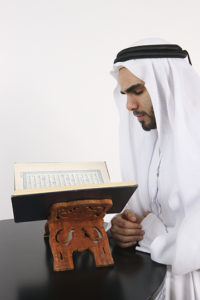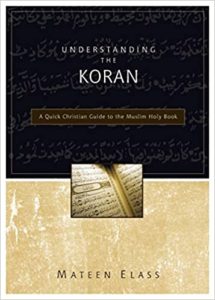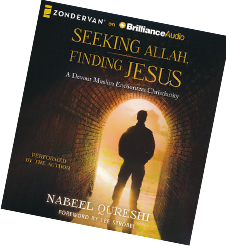Back to series



Download or Listen to Audio
A Thumbnail Sketch of Islam for Christians
Click here to open a Print - Friendly PDF
| Islam is the second biggest religion in the world. In 2014 there are 1.6 billion Muslims worldwide. Most do not live in the Middle East. There are more than 210 million people in Indonesia who say Allah is God and Muhammad the chief and seal (last) of the prophets; 150 million in India, 170 million in Pakistan. As you can see, far more Muslims live in south- and southeast Asia than in the Middle East. Sub-Saharan Africa contains more than 130 million, with 75 million in Nigeria alone.
How many Muslims live in the United States? It depends on who answers the question. Scholars at City College of New York say 1.1 million, while the Council on American-Islamic Relations (CAIR), a Muslim organization, claims 6 to 7 million. The best estimate is probably between 1 and 2 million. The 2007 Pew survey of Muslim Americans found that two-thirds are foreign-born. Among the foreign-born, most had immigrated since 1990. Of the roughly one-third of Muslim Americans who are native-born, the majority were converts and African American. There are about 1,200 mosques in the United States, which provides further evidence that the numbers are considerably less than reported by CAIR. If there were actually 5 million Muslims in the United States (and CAIR claims more), each mosque would serve nearly 4,200 Muslims. Yet many mosques are storefronts, and the nation’s largest mosque, Dar al-Hijrah near Washington, D.C., has only about 3,000 weekly attendees. Rapid Growth
|
||||

Gerald McDermott
ProfessorGerald McDermott, Professor, is a retired Anglican Chair of Divinity at Samford’s Beeson Divinity School. Prior to that, he served as Jordan–Trexler Professor of Religion at Roanoke College and taught for 26 years. He grew up in Boston, New York and Philadelphia, went to a Jesuit high school in New York City, graduated from the University of Chicago (B.A., New Testament and Early Christian Literature). He lived in religious communes for seven years, started and ran a private school for three years, pastored for five years in Iowa, and earned a Ph.D. in religion at the University of Iowa.

Recommended Reading:
Mateen Elass, Understanding the Koran: A Quick Christian Guide to the Muslim Holy Book (Zondervan, 2004)
What You Should Know about Islam’s Holy Book How is it like the Bible? How is it different? Why is it important? Muslims believe the Koran exists as a literal book in heaven and was dictated to the prophet Muhammad by the angel Gabriel. It is only the length of the New Testament, yet a fifth of the world claims it is the complete revelation of God. To most Americans, though, the Koran remains a mystery.
Nabeel Qureshi, Seeking Allah, Finding Jesus: A Devout Muslim Encounters Christianity (Zondervan, 2014)
In Seeking Allah, Finding Jesus, Nabeel Qureshi describes his dramatic journey from Islam to Christianity, complete with friendships, investigations, and supernatural dreams along the way.
Providing an intimate window into a loving Muslim home, Qureshi shares how he developed a passion for Islam before discovering, almost against his will, evidence that Jesus rose from the dead and claimed to be God. Unable to deny the arguments but not wanting to deny his family, Qureshi’s inner turmoil will challenge Christians and Muslims alike.
Engaging and thought-provoking, Seeking Allah, Finding Jesus tells a powerful story of the clash between Islam and Christianity in one man’s heart—and of the peace he eventually found in Jesus.
 COPYRIGHT: This publication is published by C.S. Lewis Institute; 8001 Braddock Road, Suite 301; Springfield, VA 22151. Portions of the publication may be reproduced for noncommercial, local church or ministry use without prior permission. Electronic copies of the PDF files may be duplicated and transmitted via e-mail for personal and church use. Articles may not be modified without prior written permission of the Institute. For questions, contact the Institute: 703.914.5602 or email us.
COPYRIGHT: This publication is published by C.S. Lewis Institute; 8001 Braddock Road, Suite 301; Springfield, VA 22151. Portions of the publication may be reproduced for noncommercial, local church or ministry use without prior permission. Electronic copies of the PDF files may be duplicated and transmitted via e-mail for personal and church use. Articles may not be modified without prior written permission of the Institute. For questions, contact the Institute: 703.914.5602 or email us.
-
Recent Podcasts
Ralph Waldo Emerson’s Philosophy and Influence
by David George Moore on July 26, 2024Ralph Waldo Emerson was a gifted nineteenth century...Read More
-
The Side B Stories – Nate Sala’s Story
by Jana Harmon, Nate Sala on July 19, 2024
-
Terrorism Through the Eyes of Faith
by Dennis Hollinger on July 12, 2024
-
Recent Publications
Hasn’t Science Proven That Belief in God Is an Outdated Superstition?
by Sharon Dirckx on July 1, 2024Many assume that scientific practice and belief in...Read More
-
Has the Bible Been Corrupted as Some Muslims Claim?
by Andy Bannister on June 1, 2024
-
Seeing Jesus Through the Eyes of Women
by Rebecca McLaughlin on May 15, 2024
0
All Booked
0.00
All Booked
0.00
All Booked
22194
C.S. Lewis’s The Abolition of Man Live Online Small Group 8:00 PM ET
https://www.cslewisinstitute.org/?event=c-s-lewiss-the-abolition-of-man-study-course&event_date=2024-10-02®=1
https://www.paypal.com/cgi-bin/webscr
2024-10-02

Next coming event
Days
Hours
Minutes
Seconds
C.S. Lewis’s The Abolition of Man Live Online Small Group 8:00 PM ET
On October 2, 2024 at 8:00 pmSpeakers

Gerald McDermott
Professor
Team Members

Gerald McDermott
ProfessorGerald McDermott, Professor, is a retired Anglican Chair of Divinity at Samford’s Beeson Divinity School. Prior to that, he served as Jordan–Trexler Professor of Religion at Roanoke College and taught for 26 years. He grew up in Boston, New York and Philadelphia, went to a Jesuit high school in New York City, graduated from the University of Chicago (B.A., New Testament and Early Christian Literature). He lived in religious communes for seven years, started and ran a private school for three years, pastored for five years in Iowa, and earned a Ph.D. in religion at the University of Iowa.



 You can also find these themes in the Bible, but Muslims and Christians have very different conceptions of the nature of scriptural inspiration. While Christians believe the Bible is a joint product of both human and divine agency, Muslims believe their holy book contains not a shred of human influence. Christians usually want to distinguish Paul’s personal writing style or cultural influences from the divine Word, for example, but Muslims deny that Muhammad’s personality or cultural affinities had anything to do with the words of the Qur’an. Muslims, then, accept a dictation theory of inspiration that nearly all Christians reject for their Bible.
You can also find these themes in the Bible, but Muslims and Christians have very different conceptions of the nature of scriptural inspiration. While Christians believe the Bible is a joint product of both human and divine agency, Muslims believe their holy book contains not a shred of human influence. Christians usually want to distinguish Paul’s personal writing style or cultural influences from the divine Word, for example, but Muslims deny that Muhammad’s personality or cultural affinities had anything to do with the words of the Qur’an. Muslims, then, accept a dictation theory of inspiration that nearly all Christians reject for their Bible.
 2. Prayer five times daily.
2. Prayer five times daily. Yet even these suspicions fall far short of the venomous hatred required to teach young men to fly jetliners as missiles into skyscrapers in order to purposely destroy thousands of innocent people. The genesis of this barbarity lies not with Islam but Islamism, the term some scholars use to distinguish mainstream Islam from the twentieth-century terroristic ideology first seen in the Ayatollah Khomeini. Islamism is preferable to the popular term Islamic fundamentalism, which was coined by the Western media to denigrate conservative Christians in the West by associating them with Islamic violence. Jeffrey Goldberg described in the New York Times Magazine the way that Islamism takes boys as young as eight years old out of dire poverty and puts them in special schools, isolated from all secular learning, art, music, women, and mainstream Islam.
Yet even these suspicions fall far short of the venomous hatred required to teach young men to fly jetliners as missiles into skyscrapers in order to purposely destroy thousands of innocent people. The genesis of this barbarity lies not with Islam but Islamism, the term some scholars use to distinguish mainstream Islam from the twentieth-century terroristic ideology first seen in the Ayatollah Khomeini. Islamism is preferable to the popular term Islamic fundamentalism, which was coined by the Western media to denigrate conservative Christians in the West by associating them with Islamic violence. Jeffrey Goldberg described in the New York Times Magazine the way that Islamism takes boys as young as eight years old out of dire poverty and puts them in special schools, isolated from all secular learning, art, music, women, and mainstream Islam.



